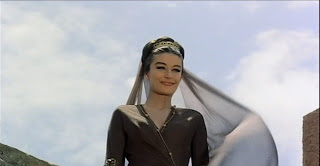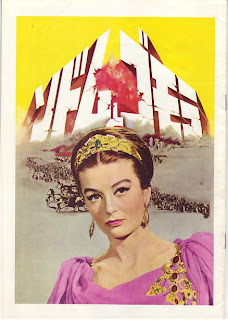Let's be pro-active today. Some of these lost films can be found one day, but there's a better chance of loosing the ones we still have. To make sure that the silent films of Alfred Hitchcock will not meet the same fate that his second film did (it is now lost), the British Film Institute launches an important restoration program and you can help by donating on their website. As a result, the movies will be presented in 2012 fully restored and with a newly recorded soundtrack.
Now about that second film. You should know that you don't become the Master of Suspense overnight. As many did, Hitchcock started progressively as a title designer, then accumulated jobs as films went by: set designer, script writer, assistant director, etc. That enabled him to become a director while mastering each link of the production chain. He started his directorial career with The Pleasure Garden. The film did not appeal to the distributor and was shelved.
Hitchcock then left for the mountains of Tyrol to shoot a second melodrama called The Mountain Eagle. The adventures he encountered during the shoot, as told in Spoto's book and more recently in Patrick McGilligan's seem more interesting than the story of the film itself which synopsis you get (as well as a complete set of pictures) in Dan Auiler's Hitchcock's Notebooks, probably the best source of information for this lost film.
Quickly told, the film tells the story of John Fulton nicknamed Fear O' God and Pettigrew who hate each other. Pettigrew's son disappears from the village after he caused a mix-up with school teacher Beatrice (Nita Naldi). Pettigrew thinks the two are lovers and tries to have Beatrice thrown out. She takes refuge at Fulton's. Pettigrew has Fulton thrown in jail for ten years for the alleged murder of his son. etc.
It's funny to see that critics of the time, while praising the directorial effort, do point out plot holes in the story, a common critic for future Hitchcock movies.
Anyway, it seems that the same distributor (C.M. Woolf) opposed the release of this film too. And it would have been the same for his third (and probably last) film if it hadn't been for Ivor Montague who, seeing its potential, re-edited the movie. The Lodger was a huge success and was considered by Hitchcock his first real film. At the time, it also enable the release of his two previous films. But if The Pleasure Garden has reached us, and a tinted copy was recently found, no known copy of The Mountain Eagle is still extant. Please check your attic.
That's all for today folks!
Now about that second film. You should know that you don't become the Master of Suspense overnight. As many did, Hitchcock started progressively as a title designer, then accumulated jobs as films went by: set designer, script writer, assistant director, etc. That enabled him to become a director while mastering each link of the production chain. He started his directorial career with The Pleasure Garden. The film did not appeal to the distributor and was shelved.
Hitchcock then left for the mountains of Tyrol to shoot a second melodrama called The Mountain Eagle. The adventures he encountered during the shoot, as told in Spoto's book and more recently in Patrick McGilligan's seem more interesting than the story of the film itself which synopsis you get (as well as a complete set of pictures) in Dan Auiler's Hitchcock's Notebooks, probably the best source of information for this lost film.
Quickly told, the film tells the story of John Fulton nicknamed Fear O' God and Pettigrew who hate each other. Pettigrew's son disappears from the village after he caused a mix-up with school teacher Beatrice (Nita Naldi). Pettigrew thinks the two are lovers and tries to have Beatrice thrown out. She takes refuge at Fulton's. Pettigrew has Fulton thrown in jail for ten years for the alleged murder of his son. etc.
It's funny to see that critics of the time, while praising the directorial effort, do point out plot holes in the story, a common critic for future Hitchcock movies.
Anyway, it seems that the same distributor (C.M. Woolf) opposed the release of this film too. And it would have been the same for his third (and probably last) film if it hadn't been for Ivor Montague who, seeing its potential, re-edited the movie. The Lodger was a huge success and was considered by Hitchcock his first real film. At the time, it also enable the release of his two previous films. But if The Pleasure Garden has reached us, and a tinted copy was recently found, no known copy of The Mountain Eagle is still extant. Please check your attic.
That's all for today folks!































































